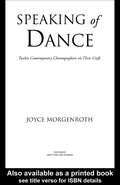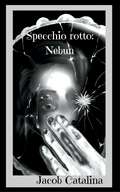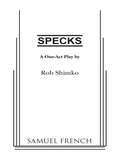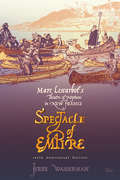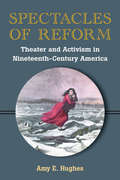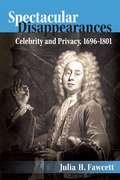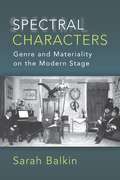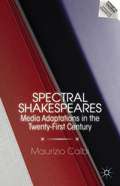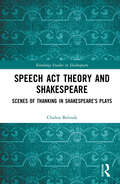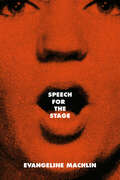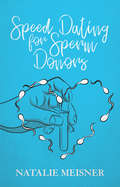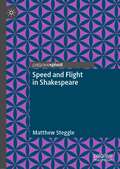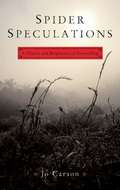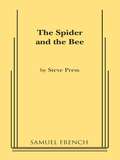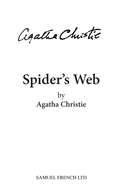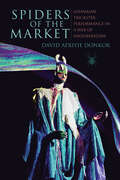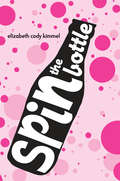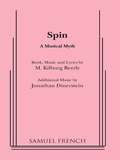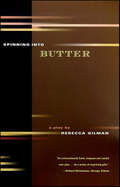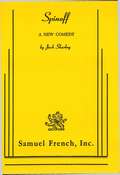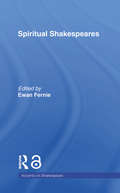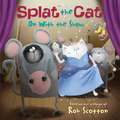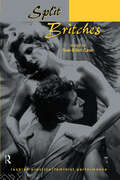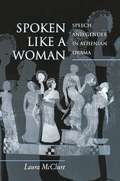- Table View
- List View
Speaking of Dance: Twelve Contemporary Choreographers on Their Craft
by Joyce MorgenrothSpeaking of Dance: Twelve Contemporary Choreographers on Their Craft delves into the choreographic processes of some of America's most engaging and revolutionary dancemakers. Based on personal interviews, the book's narratives reveal the methods and quests of, among others, Merce Cunningham, Meredith Monk, Bill T. Jones, Trisha Brown, and Mark Morris. Morgenroth shows how the ideas, craft, and passion that go into their work have led these choreographers to disrupt known forms and expectations. The history of dance in the making is revealed through the stories of these intelligent, articulate, and witty dance masters.
Specchio rotto: Nebun
by Catia Polverini Catalina Jacob“Saltò. Nessuno sentì le urla precedenti, ma solo l'impatto del suo corpo contro il marciapiede. Tutti guardarono il suo corpo inerte a terra. Una pozza cremisi tinse i suoi vestiti. «Era così buona» dicevano tra le lacrime fresche. «Si meritava il cielo», si lamentavano. Ma avevano reso la sua vita un inferno. Ignorando tutte le sue grida, annullando la sua essenza e censurando le sue parole. Ignorata in vita.” Non c'è nessun’altra come Nebun ... infelice e tradita dalla vita; accompagnata dall’indifferenza e abbandonata da chi l’ascoltava. Così inizia la sua avventura verso la libertà, ma la sfortuna la persegue e rimane intrappolata a metà strada. Da sola, più sola che mai. O forse no.
Specks
by Rob ShimkoDrama \ 2 m., 2 f. \ Int. \ In a diner on New Year's Eve a waitress named Molly, her mother and an obsessive compulsive regular who makes intricate sculptures from his dishes are trying in vain to have a party. The entrance of a stranger from a real party across the street triggers catastrophic changes for all three when he begins to seduce Molly and antagonize the others. Molly chooses between her old life and a new one with the stranger in a fiery climax.
Spectacle of Empire
by Jerry Wasserman2006 marks the four hundredth anniversary of a major theatrical event in the history of North American drama. The Theatre of Neptune in New France by lawyer, poet and historian Marc Lescarbot was a masque of welcome performed on the Bay of Fundy by members of the tiny French colony of Port Royal on November 14, 1606. It celebrated the return of the ship bearing the Sieur de Poutrincourt and navigator-explorer Samuel de Champlain from their travels along the coastline as far south as Cape Cod in search of a more temperate site for the colony. It is a paean to empire, a thanksgiving for survival and an extraordinary theatrical spectacle in a "new" world peopled by Native inhabitants who are represented in it as both characters and audience. Arguably the first American play, it has also been called "a significant entry-point of Western cultural hegemony," sparking political activists to disrupt the re-enactment planned for its four hundredth anniversary celebration. This new edition includes the original French script along with its long out-of-print English translations by American historical preservationist Harriette Taber Richardson and Canadian scholars Eugene and Renate Benson, as well as Ben Jonson's The Masque of Blackness (1605), an illustrative contemporary English imperial spectacle. The extensive historical and critical introduction and bibliography are provided by Jerry Wasserman, Professor of Theatre at the University of British Columbia.
Spectacle of Empire
by Jerry WassermanArguably the first North American play, this edition includes the original French script of Marc Lescarbot's Theatre of Neptune in New France, two twentieth-century English translations, Ben Jonson's Masque of Blackness, and an extensive historical and critical introduction by Jerry Wasserman.
Spectacles of Reform: Theater and Activism in Nineteenth-Century America
by Hughes Amy E.In the nineteenth century, long before film and television arrived to electrify audiences with explosions, car chases, and narrow escapes, it was America's theaters that offered audiences such thrills, with "sensation scenes" of speeding trains, burning buildings, and endangered bodies, often in melodramas extolling the virtues of temperance, abolition, and women's suffrage. In Spectacles of Reform , Amy E. Hughes scrutinizes these peculiar intersections of spectacle and reform, revealing that spectacle plays a crucial role in American activism. By examining how theater producers and political groups harnessed its power and appeal, Hughes suggests that spectacle was—and remains—central to the dramaturgy of reform. Engaging evidence from lithographs to children's books to typography catalogs, Hughes traces the cultural history of three famous sensation scenes—the drunkard suffering from the delirium tremens, the fugitive slave escaping over a river, and the victim tied to the railroad tracks—assessing how they conveyed, allayed, and denied concerns about the rights and responsibilities of citizenship. These images also appeared in printed propaganda, suggesting that the coup de théâtre was an essential part of American reform culture. Additionally, Hughes argues that today's producers and advertisers continue to exploit the affective dynamism of spectacle, reaching an even broader audience through film, television, and the Internet. To be attuned to the dynamics of spectacle, Hughes argues, is to understand how we see. Consequently, Spectacles of Reform will interest not only theater historians, but also scholars and students of political, literary, and visual culture who are curious about how U. S. citizens saw themselves and their world during a pivotal period in American history.
Spectacular Disappearances: Celebrity and Privacy, 1696-1801
by Julia H. FawcettHow can people in the spotlight control their self-representations when the whole world seems to be watching? The question is familiar, but not new. Julia Fawcett examines the stages, pages, and streets of eighteenth-century London as England's first modern celebrities performed their own strange and spectacular self-representations. They include the enormous wig that actor Colley Cibber donned in his comic role as Lord Foppington-and that later reappeared on the head of Cibber's cross-dressing daughter, Charlotte Charke. They include the black page of Tristram Shandy, a memorial to the parson Yorick (and author Laurence Sterne), a page so full of ink that it cannot be read. And they include the puffs and prologues that David Garrick used to heighten his publicity while protecting his privacy; the epistolary autobiography, modeled on the sentimental novel, of Garricks protégée George Anne Bellamy; and the elliptical poems and portraits of the poet, actress, and royal courtesan Mary Robinson, a. k. a. Perdita. Linking all of these representations is a quality that Fawcett terms "over-expression," the unique quality that allows celebrities to meet their spectators' demands for disclosure without giving themselves away. Like a spotlight so brilliant it is blinding, these exaggerated but illegible self-representations suggest a new way of understanding some of the key aspects of celebrity culture, both in the eighteenth century and today. They also challenge divides between theatrical character and novelistic character in eighteenth-century studies, or between performance studies and literary studies today. The book provides an indispensable, history for scholars and students in celebrity studies, performance studies, and autobiography-and for anyone curious about the origins of the eighteenth-century self. Book jacket.
Spectral Characters: Genre and Materiality on the Modern Stage
by Sarah BalkinTheater’s materiality and reliance on human actors has traditionally put it at odds with modernist principles of aesthetic autonomy and depersonalization. Spectral Characters argues that modern dramatists in fact emphasized the extent to which humans are fictional, made and changed by costumes, settings, props, and spoken dialogue. Examining work by Ibsen, Wilde, Strindberg, Genet, Kopit, and Beckett, the book takes up the apparent deadness of characters whose selves are made of other people, whose thoughts become exteriorized communication technologies, and whose bodies merge with walls and furniture. The ghostly, vampiric, and telepathic qualities of these characters, Sarah Balkin argues, mark a new relationship between the material and the imaginary in modern theater. By considering characters whose bodies respond to language, whose attempts to realize their individuality collapse into inanimacy, and who sometimes don’t appear at all, the book posits a new genealogy of modernist drama that emphasizes its continuities with nineteenth-century melodrama and realism.
Spectral Shakespeares
by Maurizio CalbiSpectral Shakespeares is an illuminating exploration of recent, experimental adaptations of Shakespeare on film, TV, and the web. Drawing on adaptation studies and media theory as well as Jacques Derrida's work, this book argues that these adaptations foreground a cluster of self-reflexive "themes" - from incorporation to reiteration, from migration to addiction, from silence to survival - that contribute to the redefinition of adaptation, and Shakespearean adaptation in particular, as an unfinished and interminable process. The "Shakespeare" that emerges from these adaptations is a fragmentary, mediatized, and heterogeneous presence, a spectral Shakespeare that leaves a mark on our contemporary mediascape.
Speech Act Theory and Shakespeare: Scenes of Thanking in Shakespeare’s Plays (Routledge Studies in Shakespeare)
by Chahra BeloufaSpeech Act Theory and Shakespeare delves deeper than linguistic ornamentation to illuminate the complex dynamics of thanking as a significant speech act in Shakespearean plays. The word “thanks” appears nearly 400 times in 37 Shakespearean plays, calling for a careful investigation of its veracity as a speech act in the 16th-century setting. This volume combines linguistic analysis to explore the various uses of thanks, focusing on key thanking scenes across a spectrum of plays, including All’s Well That Ends Well, Romeo and Juliet, The Merchant of Venice, Timon of Athens, The Winter’s Tale, and the Henriad. Shakespeare’s works indicate the act of thanking to be more than a normal part of dialogue; it is an artistic expression fraught with pitfalls similar to those of negative speech acts. The study aims to determine what compels the characters in Shakespeare to offer thanks and evaluates Shakespeare’s accomplishment in imbuing the word “thanks” with performance quality in the theatrical sphere. This work adds to our comprehension of Shakespearean plays and larger conversations on the challenges of language usage in theatrical and cultural settings by examining the convergence of gratitude with power dynamics, political intrigue, and interpersonal relationships, drawing on a multidisciplinary approach that includes pragmatics, philosophy, religion, and psychology.
Speech for the Stage
by Evangeline MachlinFrom its original publication, thousands of actors have used this classic text to develop and refine their voice and speech. Evangeline Machlin includes warm-up routines for the voice but initially focuses on the importance of listening. She also discusses such important elements as relaxation, phonetics, articulation, resonance, pitch, rate of speech and stress. In addition, there are chapters on dialects, on reading aloud, sight reading, auditioning and performance.
Speed Dating for Sperm Donors
by Natalie MeisnerCan a lesbian couple find Mr. Right? Helen and Paige really want a baby. Maybe even two. They’ve decided they want to use a sperm donor, but because of Paige’s own upbringing as an adopted child they want the donor to at least be known to the child. This challenge makes the normally anonymous favour even harder and more intimate than they expected. And then there are the options for donors. Through the fast-paced “dating” of several candidates, all of whom come with their own warning labels, Helen and Paige’s relationship is strained to a point where they must remember why they set out on this journey together in the first place.
Speed and Flight in Shakespeare
by Matthew SteggleShakespeare's plays are fascinated by the problems of speed and flight. They are repeatedly interested in humans, spirits, and objects that move very fast; become airborne; and in some cases even travel into space. In Speed and Flight in Shakespeare, the first study of any kind on the subject, Steggle looks at how Shakespeare’s language explores ideas of speed and flight, and what theatrical resources his plays use to represent these states. Shakespeare has, this book argues, an aesthetic of speed and flight. Featuring chapters on The Comedy of Errors, A Midsummer Night’s Dream, Romeo and Juliet, Henry V, Macbeth and The Tempest, this study opens up a new field around the ‘historical phenomenology’ of early modern speed.
Spider Speculations
by Jo Carson"I've spent about 15 years plus some working with people's stories in a series of communities in this country. I write plays from oral histories for those communities. Just finished my 30th. I'm watching people's lives and communities literally change, sometimes drastically, for the work. Spider Speculations is the beginning of trying to understand the hows and whys of all the changes."--Author Jo CarsonJo Carson lays bare her personal investigation into her own creative process after a spider bite on her back begins a series of life-altering events. Spider Speculations applies cutting edge mind-body science, quantum physics and ancient shamanistic techniques to describe how stories work in our bodies and our lives, and what happens when real stories are used in a public way. Carson, whose ability to capture the spoken word hallmarks her community-based work, sets down this story in her own distinctive voice, interspersing the journey with examples of her performance work. This truly original American book will speak to anyone thinking about art and community or engaging with people's stories.Jo Carson is a writer and performer living in John City, Tennessee. She has published award-winning plays, short stories, children's books, essays, poems and other work. Her play Whispering to Horses and solo show If God Came Down...premiered at Seven Stages in Atlanta. She currently performs Liars, Thieves, and Other Sinners on the Bench, made up of selected stories from her oral history plays, which will be published by TCG in 2007.
Spider and the Bee
by Stephen PressPlay \ 5 m. & f. \ Bare stage. \ This delightful play for a wide age group is based on Jonathan Swift's story "Battle of the Books". It won the National Children's Theatre Playwrighting Competition, and has had many successful productions nationwide. The story is about a "battle" between a spider, who believes "we were born to think and the sciences and math are what make us think," and a bee, who has "soared toward the sun, sung with the meadowlark and heard the thousand tongues of man and insects.'. The bee believes only in the glory, and power, of poetry. Other characters include a Termite, a Butterfly and a Ladybug. A "trial" is held, during which the spider and the bee argue their points of view-- and the other characters must decide who is the "winner" of this debate. The play is loaded with broad humor and fun, as well as food for thought.
Spider's Web
by Agatha ChristieFull Length Play / Mystery Thriller / 8m, 3f / Interior Set. Clarissa, the second wife of Henry Hailsham Brown, is adept at spinning tales of adventure for their bored diplomatic circle. When a murder takes place in her drawing room she finds live drama much harder to cope with, especially as she suspects the murderer might be her young stepdaughter Pippa. Worse still, the victim is the man who broke up Henry's first marriage. Moreover Henry will be arriving shortly with a V.I.P. who might take a dim view of bodies in the drawing room. Clarissa's fast talking places her and Pippa in some hair raising experiences. By the time Henry arrives, the murderer has been unmasked and all is normal so normal that Henry is unable to believe Clarissa when she explains why there are no refreshments for their honored guest.
Spiders of the Market: Ghanaian Trickster Performance in a Web of Neoliberalism (African Expressive Cultures)
by David Afriyie DonkorAn analysis of the trickster spider character from West African folklore, performance, and Ghanian politics.The Ghanaian trickster-spider, Ananse, is a deceptive figure full of comic delight who blurs the lines of class, politics, and morality. David Afriyie Donkor identifies social performance as a way to understand trickster behavior within the shifting process of political legitimization in Ghana, revealing stories that exploit the social ideologies of economic neoliberalism and political democratization. At the level of policy, neither ideology was completely successful, but Donkor shows how the Ghanaian government was crafty in selling the ideas to the people, adapting trickster-rooted performance techniques to reinterpret citizenship and the common good. Trickster performers rebelled against this takeover of their art and sought new ways to out trick the tricksters.“A precise and inviting appeal to political economy, performance, and the enduring relevance of the cultural and archetypal trickster.” —D. Soyini Madison, Northwestern University“David Afriyie Donkor’s experience as a theatre artist and director supports the rich political economic component that frames this analysis of performance and performance traditions for broad audiences.” —Jesse Weaver Shipley, Haverford College“By sharing the performance experiences, rather than texts, Donkor accomplishes the challenging task of introducing rare theatre performances in a particularly compelling context for a Western readership in a global age.” —Theatre Survey“Overall, as a Ghanaian actor and director as well as a scholar, Donkor’s cultural insider analyses of ananse theatre within the space of political economy make important contributions and interventions to the discourses on performance (theory) and neoliberalism and their interaction in Ghana and Africa.” —African Studies Review
Spin The Bottle
by Elizabeth Cody KimmelMiddle school is an Entirely New Planet. The girls look fully grown in the most glamorous and complicated ways, and the boys look... well, weird. The good news? Drama Club. Real Drama Club -- with actual auditions, and roles involving more than the days of the week. Phoebe Hart has waited a long time for this. The stage, after all, is the one place the "flawed and unremarkable" Phoebe can let her inner star out. But when she learns of the opening night tradition?a game of Spin the Bottle?things suddenly get way more complicated. Enter: a heart-stopping crush, a best friend who might not be, two bloodthirsty Drama Divas, and a certain spinning bottle. Is it worth all the drama for a girl who just wants to fit in, and maybe prove her acting chops along the way? Welcome to middle school, Phoebe Hart....
Spin: A Musical Myth
by Jonathan Dinerstein M. KilburgMusical \ 3 m, 6 f. \ Unit set with phases. \ Inspired by the classical myth about a girl whose brilliant weaving rivals that of the gods, this exciting musical is set in ancient Greece but employs modern language and imagery. A headstrong teen determined to achieve success and fame as an artist is encouraged by four of the Muses, cleverly portrayed as a girl singing group, to leave her village for the city. In Athens she is challenged to compete by the jealous goddess Athena. The resulting showdown of mythic proportions forever changes her view of the world and her creative life. The tuneful pop-rock score has gospel, doo-wop, blues and more. Original and smart, Spin is ideal for schools and community theatres looking for a charming, off-the-beaten-track musical that is perfect for all audiences and suitable for multiracial and ethnic casting.
Spinning into Butter: A Play
by Rebecca GilmanSet on a college campus in Vermont, Spinning into Butter is a new play by a major young American playwright that explores the dangers of both racism and political correctness in America today in a manner that is at once profound, disturbing, darkly comic, and deeply cathartic. Rebecca Gilman challenges our preconceptions about race relations, writing of a liberal dean of students named Sarah Daniels who investigates the pinning of anonymous, clearly racist letters on the door of one of the college's few African American students. The stunning discovery that there is a virulent racist on campus forces Sarah, along with other faculty members and students, to explore her feelings about racism, leading to surprising discoveries and painful insights that will rivet and provoke the reader as perhaps no play since David Mamet's Oleanna has done.Spinning into Butter had its world premiere at the Goodman Theatre in Chicago in May 1999 and opened at the Vivian Beaumont Theater at Lincoln Center in New York in April 2000.
Spinoff
by Jack SharkeyComedy / 3m, 3f / Interior / Peter Colton, a bank official, unwittingly comes home with the loot from a bank robbery masterminded by Willy Nicholas, his superior at the bank. Willy, frantic to retrieve the money, enlists Peter's services to help him find it, with the help of Victoria Wickey, Peter's secretary. Meantime, Laurel Colton, Peter's daughter, has found the loot and erroneously supposes it is her father who has robbed the bank, so she enlists the aid of her boy friend Carlos Ortega, whose uncle is a retired forger of passports, to help her father flee the country. But the arrival of Sheila Mahoney, a travel agent who is helping Peter plan a surprise vacation to Rio for Laurel, complicates matters even further, since thanks to another plot afoot she thinks Victoria is married to Willy and planning a honeymoon in Rio for the two of them. By the time Victoria shows up with Peter's and Laurel's passports for the surprise vacation, Willy shows up with his and Victoria's passports for a quick escape, and Carlos shows up with a pair of forged passports to help Laurel and Peter escape, everybody is in an ungodly mess, the police may close in any minute, all concerned are fearfully mistaken about everyone else's motives and loyalties, and doom and shame and prison stare them all in the face.
Spiritual Shakespeares (Accents on Shakespeare)
by Ewan FernieSpiritual Shakespeares is the first book to explore the scope for reading Shakespeare spiritually in the light of contemporary theory and current world events. Ewan Fernie has brought together an exciting cast of critics in order to respond to the ‘religious turn’ in recent literary theory and to the spiritualized politics of terrorism and the ‘War on Terror’. Exploring a genuinely new perspective within Shakespeare Studies, the volume suggests that experiencing the spiritual intensities of the plays could lead us back to dramatic intensity as such. It tests spirituality from a political perspective, as well as subjecting politics to an unusual spiritual critique. Amongst its controversial and provocative arguments is the idea that a consideration of spirituality might point the way forward for materialist criticism. Reaching across and beyond literary studies to offer challenging and powerful contributions from leading scholars, this book offers unique readings of some very familiar plays.
Splat the Cat: On with the Show (Splat the Cat)
by Rob ScottonSplat the Cat can't wait to be in his school play about castles and kings and queens—maybe he'll even get to play a knight! Will Splat find a way to steal the show? Join him and his classmates for another hilarious Splat the Cat adventure!
Split Britches: Lesbian Practice/Feminist Performance
by Sue-Ellen CaseThe Split Britches theatre company have led the way in innovative and challenging lesbian performance for the last decade. Split Britches: Lesbian Practice/Feminist Performance is a long awaited celebration of the theatre and writing of Lois Weaver, Peggy Shaw and Deborah Margolin, who make up this outstanding troupe. This unique anthology comes complete with: * seven of Split Britches' best loved performance texts * a critical, historical introduction by Sue-Ellen Case * programme notes to accompany each of the plays * a range of stunning photographic illustrations The publication of the Split Britches play texts, collected here for the first time, provides invaluable access to these celebrated performance pieces for both the student and contemporary arts audience.
Spoken Like a Woman: Speech and Gender in Athenian Drama
by Laura McClureIn ancient Athens, where freedom of speech derived from the power of male citizenship, women's voices were seldom heard in public. Female speech was more often represented in theatrical productions through women characters written and enacted by men. In Spoken Like a Woman, the first book-length study of women's speech in classical drama, Laura McClure explores the discursive practices attributed to women of fifth-century b.c. Greece and to what extent these representations reflected a larger reality. Examining tragedies and comedies by a variety of authors, she illustrates how the dramatic poets exploited speech conventions among both women and men to construct characters and to convey urgent social and political issues.From gossip to seductive persuasion, women's verbal strategies in the theater potentially subverted social and political hierarchy, McClure argues, whether the women characters were overtly or covertly duplicitous, in pursuit of adultery, or imitating male orators. Such characterization helped justify the regulation of women's speech in the democratic polis. The fact that women's verbal strategies were also used to portray male transvestites and manipulators, however, suggests that a greater threat of subversion lay among the spectators' own ranks, among men of uncertain birth and unscrupulous intent, such as demagogues skilled in the art of persuasion. Traditionally viewed as outsiders with ambiguous loyalties, deceitful and tireless in their pursuit of eros, women provided the dramatic poets with a vehicle for illustrating the dangerous consequences of political power placed in the wrong hands.
